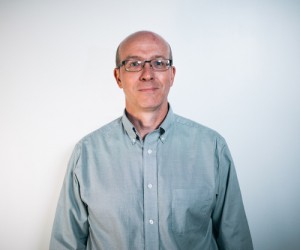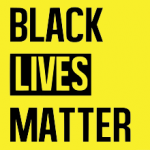By Rev. Danny Chisholm
Last Thursday, February 2, was Groundhog’s Day! But, I’ve been seeing a different kind of shadow. And I don’t know how many more weeks of bad weather are heading our way.
Division has become more than a word in our vocabulary. It’s become a way of life, and making it increasingly difficult to keep people together literally and spiritually in the local church.

I serve as pastor of what I would consider a politically and socially diverse people. We usually behave ourselves around each other when it’s election time. It’s often a good idea not to talk about certain topics in our society: religion and politics come to mind.
But, how do you avoid those particular topics in the church? The short answer is: you can’t.
When people ask me what it’s like to be a pastor these days, my usual response is “it’s not boring.” That’s about the most truthful and accurate answer that I have. Being in a local church has always offered it’s share of challenges, but in our national climate, there is a greater sense of urgency and fear relating to our future. I find myself walking an unusually narrow divide among individuals who find biblical evidence to support whatever social or political opinion they happen to hold.
This is nothing new. However, in an age where “fake news” is part of our national dialogue, I want to carve out a space where people of all races, opinions, and political persuasions can find common ground.
It isn’t easy, and it never has been.
Tom Brokaw celebrated his 50th anniversary as a news correspondent for NBC News. He reflected upon decades of history making events as he conducted interviews and was interviewed. When asked if he could recall a time when our country was as divided (or more divided) than today, he responded “1968.” This was a year when the nation was in turmoil over the assassinations of Martin Luther King, Jr. and Robert Kennedy. The country was divided over the Vietnam war, and the uncertainty and drama of that time made it appear the nation was coming apart at the seams.
Brokaw’s critique of that turbulent time period offered me hope. It made me realize that this country has been through and survived tremendous stress and obstacles. It also prompted me to take a longer view of things and to do my best to not view things as “the end of the world.”
The church has been going through hard times and persecution for centuries, and we ought not act like we are entitled to an easy go of things. The political and societal divides that separate us can also provide opportunities for the church to bridge them. We do, however, need to mindful that divisions can find their way into the church if we aren’t careful.
The Apostle Paul admonished the church at Ephesus to “make every effort to keep the unity of the Spirit through the bond of peace” (Ephesians 4.3). He offered several virtues which would be necessary to carry this challenge out: humility, gentleness, patience, forbearance, all of these rooted in love. He continued to list seven “ones” which reflected the tremendous unity that is ours as the body of Christ, including but not limited to the fact that we are one body and have one Lord.
As I spent more time reflecting on Paul’s words, it occurred to me that unity of the Spirit requires effort. It requires “every” effort, which is a continual process of exerting our spiritual energies toward “keeping the main thing the main thing.” Unity in the church was a challenge in the 1st century; it’s a challenge in the 21st century.
I marvel at the opinions of fellow believers. One moment I’m talking to someone who is scared to death about what is happening in the White House. Another moment I’m hearing someone talk about how excited he is about the political changes in the works. How in the world am I going to keep all these folks together? The range of social and political perspectives represented in the pews these days creates a monumental challenge, unless of course you are in a church with a homogenized view of politics.
That hasn’t been my story, and I’m really glad. I’ve been working hard to provide space for persons with differences, even when I am disturbed by what I hear and read from people who call themselves Christians.
It grieves me to see and hear about conflict over what is happening in the political or social arenas. But, it also encourages me to see and hear people raise their voices to protest injustice.
This is an important season for the church. We must remember that the criterion for being part of the body of Christ is affirming “Jesus Christ is Lord.” Being part of a church isn’t always easy. Christians have been persecuted for their faith for years, and dissent has been part of my Baptist heritage for centuries. There are times when the church facing opposition may actually be a blessing.
At no point do I read anything in Scripture about how Christians should be comfortable with their culture. Maybe the church is finding its voice once again. Hopefully, we are realizing the theological differences that have separated Christians in the past are far less important than what unites us. We don’t have to divide over our disagreements. We can learn from one another and as Paul said”put up with one another” by putting those radical Christian virtues to use.
I’ll be using the passage on a Sunday when we celebrate the Ordinance of the Lord’s Supper. Some people call this communion. We will eat the bread and drink the cup as a church, doing this to remember that brings us together is far more important than what can tear us part.
It’s an amazing thing to sit around this table with people who share such diverse views on just about everything. Yet, there is room for each one of them. And for me.
Unity is costly. It cost Jesus his life, and it put Paul in prison. I wonder what cost the church is willing to pay to promote and preserve our common faith, hope, and love in Jesus Christ. Whatever happens, it’s not going to be boring. Thanks be to God!
Danny Chisholm serves as senior pastor of University Heights Baptist Church in Springfield, Mo. Read his blog online at https:/dannychisholm.wordpress.com and connect on Twitter at @ChisholmDanny
Note: The views expressed here in columns and commentaries are solely those of the authors.
Interested in writing for CBF at Patheos? Submit your column idea to CBF Communications Director Aaron Weaver at [email protected].










